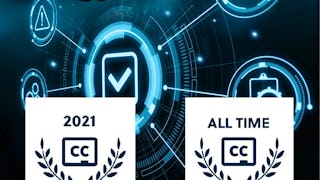- Browse
- Greek Mythology
Greek Mythology Courses
Courses in Greek mythology can help you learn about the pantheon of gods and goddesses, mythological heroes, and the cultural significance of myths in ancient Greece. You can build skills in literary analysis, critical thinking, and understanding narrative structures through the exploration of epic tales like those of Homer and Hesiod. Many courses also introduce tools such as digital archives and interactive timelines, which enhance your ability to analyze texts and connect historical contexts with mythological themes.
Popular Greek Mythology Courses and Certifications
 Status: Free TrialFree TrialN
Status: Free TrialFree TrialNNew York Institute of Finance
Skills you'll gain: Reinforcement Learning, Recurrent Neural Networks (RNNs), Financial Trading, Deep Learning, Portfolio Management, Artificial Intelligence and Machine Learning (AI/ML), Artificial Neural Networks, Applied Machine Learning, Markov Model, Portfolio Risk, Financial Market, Time Series Analysis and Forecasting, Risk Management
3.5·Rating, 3.5 out of 5 stars245 reviewsIntermediate · Course · 1 - 4 Weeks
 Status: Free TrialFree TrialU
Status: Free TrialFree TrialUUniversity of Pennsylvania
Skills you'll gain: Intellectual Property, Healthcare Industry Knowledge, Pharmaceuticals, Regulation and Legal Compliance, Health Care, Legal Strategy, Medical Science and Research, Business Valuation, Case Studies, Molecular Biology, Economics
4.8·Rating, 4.8 out of 5 stars146 reviewsBeginner · Course · 1 - 4 Weeks
 Status: Free TrialFree TrialL
Status: Free TrialFree TrialLLudwig-Maximilians-Universität München (LMU)
Skills you'll gain: Business Strategy, Game Theory, Strategic Thinking, Competitive Analysis, Strategic Partnership, Product Strategy, Strategic Decision-Making, New Product Development, Market Analysis, Innovation
4.8·Rating, 4.8 out of 5 stars3.1K reviewsMixed · Course · 1 - 3 Months
 Status: PreviewPreviewT
Status: PreviewPreviewTThe Hong Kong University of Science and Technology
Skills you'll gain: Continuous Monitoring, Risk Management, FinTech, Change Management, Emerging Technologies
4.7·Rating, 4.7 out of 5 stars4K reviewsBeginner · Course · 1 - 4 Weeks
 Status: Free TrialFree TrialD
Status: Free TrialFree TrialDDeepLearning.AI
Skills you'll gain: Unsupervised Learning, Data Ethics, Machine Learning, Supervised Learning, Artificial Intelligence, Reinforcement Learning, Artificial Neural Networks, Deep Learning, Anomaly Detection, Dimensionality Reduction, Algorithms
4.9·Rating, 4.9 out of 5 stars5.4K reviewsBeginner · Course · 1 - 4 Weeks
 Status: PreviewPreviewÉ
Status: PreviewPreviewÉÉcole Polytechnique Fédérale de Lausanne
Skills you'll gain: Social Justice, Community Development, Governance, Sustainable Development, Systems Thinking, Information Technology, Economic Development, Policty Analysis, Research, and Development, Digital Transformation, Stakeholder Engagement, Case Studies
4.7·Rating, 4.7 out of 5 stars185 reviewsIntermediate · Course · 1 - 3 Months
 Status: Free TrialFree TrialD
Status: Free TrialFree TrialDDeepLearning.AI
Skills you'll gain: Recurrent Neural Networks (RNNs), Hugging Face, Natural Language Processing, Artificial Neural Networks, Embeddings, Deep Learning, Transfer Learning
4.8·Rating, 4.8 out of 5 stars31K reviewsIntermediate · Course · 1 - 4 Weeks
 Status: PreviewPreviewU
Status: PreviewPreviewUUniversiteit Leiden
Skills you'll gain: Risk Management, Business Risk Management, Operational Risk, Risk Analysis, Safety and Security, Environmental Issue, Cyber Security Strategy, Decision Making, Public Health
4.7·Rating, 4.7 out of 5 stars227 reviewsBeginner · Course · 1 - 3 Months
 Status: Free TrialFree TrialJ
Status: Free TrialFree TrialJJohns Hopkins University
Skills you'll gain: Architectural Design, Sustainable Development, Building Codes, Community Development, Land Development, Sustainable Architecture, Building Design, Sustainable Design, Sustainable Technologies, Construction, Climate Change Mitigation, Disabilities, Traffic Flow Optimization, Environmental Policy, Environmental Engineering, Policy Analysis, Case Studies
4.7·Rating, 4.7 out of 5 stars230 reviewsIntermediate · Course · 1 - 4 Weeks
 Status: Free TrialFree TrialU
Status: Free TrialFree TrialUUniversity of Virginia
Skills you'll gain: Business Strategy, Strategic Thinking, Competitive Analysis, Organizational Strategy, Business Planning, Strategic Decision-Making, Corporate Strategy, Market Analysis, Analysis, Value Propositions
4.8·Rating, 4.8 out of 5 stars3.3K reviewsBeginner · Course · 1 - 4 Weeks
 Status: PreviewPreviewY
Status: PreviewPreviewYYale University
Skills you'll gain: Legal Strategy, Legal Proceedings, Legal Research, Legal Writing, Policy Analysis, Case Studies, Learning Strategies, Economics
4.7·Rating, 4.7 out of 5 stars1.6K reviewsMixed · Course · 1 - 3 Months
 Status: NewNewStatus: PreviewPreviewA
Status: NewNewStatus: PreviewPreviewAAnthropic
Skills you'll gain: Model Context Protocol, Web Servers, Cloud Deployment
Mixed · Course · 1 - 4 Weeks
In summary, here are 10 of our most popular greek mythology courses
- Reinforcement Learning for Trading Strategies: New York Institute of Finance
- Intellectual Property in the Healthcare Industry: University of Pennsylvania
- Competitive Strategy: Ludwig-Maximilians-Universität München (LMU)
- Information Systems Auditing, Controls and Assurance: The Hong Kong University of Science and Technology
- Unsupervised Learning, Recommenders, Reinforcement Learning: DeepLearning.AI
- Innovative Governance of Large Urban Systems: École Polytechnique Fédérale de Lausanne
- Sequence Models: DeepLearning.AI
- Risk in Modern Society : Universiteit Leiden
- Transportation, Sustainable Buildings, Green Construction: Johns Hopkins University
- Foundations of Business Strategy: University of Virginia










